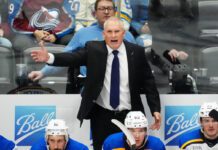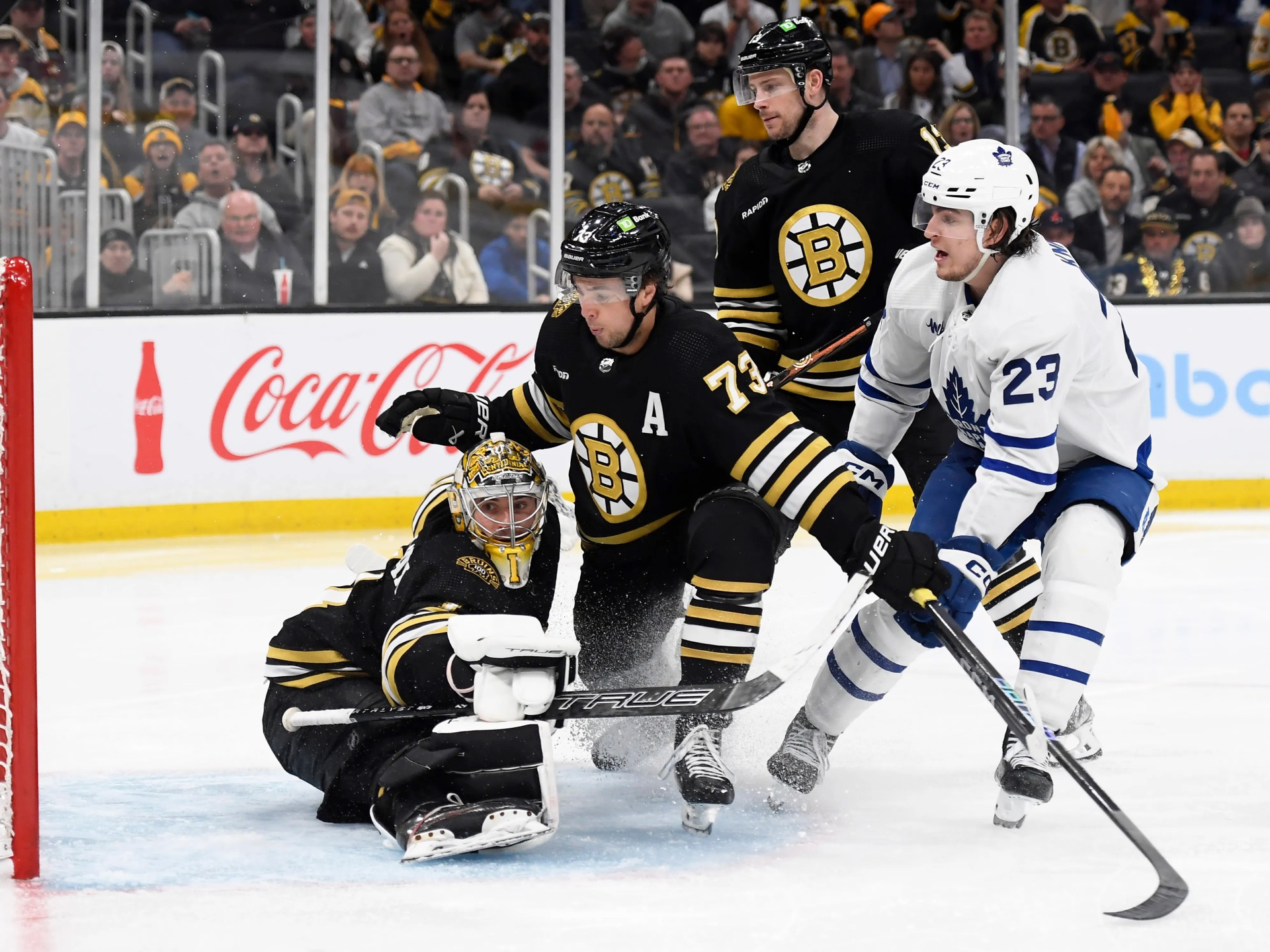With their backs against the wall and without Auston Matthews, the Toronto Maple Leafs played their best game of the series in Game 5 and earned a series-extending 2-1 win.
Mitch Marner played his best game of the series, leading a top line that was excellent all night long. John Tavares and Matthew Knies combined on the OT winner, while Joe Woll was game-savingly good in net, even on a night where Toronto generally won the territorial battle. In the process, the Leafs overcame the Matthews-sized hole in the lineup and another sharp game from Jeremy Swayman to send the series back to Toronto.
Turning Points
In a low-scoring game like Game 5, there aren’t too many flashpoint moments we can turn to that turned the game other than big saves made by the goalies. As a result, I’m going to do exactly that and use this section to talk about Joe Woll, whose performance in net kept the Leafs alive long enough to win it in OT. The goal he allowed in the first period was a tough luck bounce — trickling into the slot and right onto the stick of Trent Frederic, it was an incredibly tough shot for Woll to stop. I don’t fault him on it; it was a rough turnover and a poor bounce.
Woll was completely clean otherwise, making 27 saves on the evening. Your starting goalie needs to rise to the occasion in the biggest moments in the playoffs, and Woll did exactly that in his first start of the series. He wasn’t asked to do much in the first period, but the Leafs needed Woll’s prowess to deliver throughout the next 2.5 periods. In the second frame, Woll made a massive stop in tight on Jesper Boqvist, who got behind Morgan Rielly and received a perfect pass from Brad Marchand. Woll also stuck his toe out to get a piece of a fluttering shot to help kill off Boston’s lone power play of the game in the second period.
The degree of difficulty increased into the third as the intensity of the game ramped up. Charlie Coyle and Marchand created a chance in tight, but Woll stood his ground and remained calm as Marchand’s shot fluttered wide. Later on, with the game still tied 1-1, Woll made the signature save of the night, extending his pad to deny Trent Frederic, who was in all alone. Frederic took it on his forehand, looking to tuck the puck far post, but Woll’s fluid extension held the post, and Frederic didn’t elevate the puck. That was Boston’s best look after the game was evened at one apiece. Woll’s save singlehandedly sent the game to OT.
That is when the true turning point arrived. The Bruins owned the first overtime shift and held the zone in the Toronto end, creating a chance for Charlie Coyle that required a good kick save from Woll. It wasn’t an A+, highlight-reel save like the one on Frederic in the third was, but it was an example of what Woll was so good at in this game: calm and composed, positional saves that limited second chances and kept providing the Leafs with opportunities to win it. This save in overtime was the one the Leafs needed to put them over the top.
When John Tavares drove the net around Matt Grzelyck, the puck kicked out to the far side with Jeremy Swayman down, and Matthew Knies flipped the puck into the yawning cage. All of this was possible because each one of the Woll saves was its own little turning point—pivotal plays needed to give the Leafs opportunities to crack the Swayman code and scratch out the necessary second goal. The Leafs don’t win this game without a sharp and steady Joseph Woll in net.
Notable Performances
The biggest non-Joseph Woll story of this game is the play of the Leafs’ top line, consisting of Mitch Marner, Tyler Bertuzzi, and Max Domi. Though Marner did not score a goal, he played his best game of the series by far, and that line cleaned up in the underlying numbers. Shot attempts were 23-12 in Toronto’s favor with those three on the ice, and from an eye-test perspective, Marner was as alive as we’ve seen him in the series. Bertuzzi and Domi looked as sharp next to #16 — as they had on the old line next to #34 — but Marner’s turnaround was the bigger deal. The Leafs need that version of Marner — buzzing around, confidently making passes as his line hems in the opposition — to keep going for (hopefully) the next two games of the series.
The line of John Tavares, William Nylander, and Matthew Knies was just as good, and they scored the big game-winning tally. I thought Nylander looked much closer to normal, sharper with the puck than he was in Game 4 as the night progressed. He still took a bad penalty — and I would’ve liked to see him cut around Swayman on his mini-break out of the box instead of going short-side (he hit the post) — but Nylander did have several sweet passes. One in the Boston zone to set up Joel Edmundson — for a shot that didn’t even come close to the net — could’ve been highlight-reel material if Edmundson was a better shooter. As for Tavares, you’ve gotta give him and Knies credit — it was the same combo that combined on the OT winner against Tampa in Game 6 last season. They’ve shown a bit of a clutch gene.
Unfortunately, as good as the top two lines were, the fourth line was up against it in the run of play. David Kämpf centering Connor Dewar and Ryan Reaves were underwater to the tune of two shot attempts for versus 11 against. It felt that those three were chasing the play around in their own end basically every time they were on the ice, and several of those big Woll saves came during fourth-line shifts. It feels like a lineup change could be in order for Game 6; something needs to change on this front, or it could sink Toronto in a future game of this series. Keefe shortened the bench to three lines and ran Dewar – Kampf – Jarnkrok instead of continuing to trot out this line-four combination.
With the Leafs badly in need of offense from the blue line, Jake McCabe scored a big goal, a point shot through traffic that reminded me of the goals that the Leafs scored on Andrei Vasilevskiy last year. They need to be taking more of those shots and play for rebounds against a goalie as dialed in as Swayman. Hopefully, McCabe’s goal will serve as visual evidence of that. He and Simon Benoit continue to hang in there against very difficult minutes — crucial parts of Toronto’s effort in this series. I thought McCabe was very solid and steady in this game, but Benoit was a little rockier, turning a puck over that led to Boston’s lone goal. Adjusting to playoff hockey has been a bit of a turbulent ride for the relatively-green Benoit (to no one’s surprise), as Boston’s forecheck pressure has been a lot for him to handle. It hasn’t been a death knell yet, but it’s something to keep an eye on moving forward.
Storylines for Game 6
1. Auston Matthews’ health. After three columns where William Nylander’s health was talking point #1, the health of Matthews is now the talking point for obvious reasons. It remains unclear what the ailment is — some sort of mix between illness and injury, it would appear — but it is obviously severe if it kept Matthews out of an elimination game. Can it be resolved before Game 6? The Leafs showed they could win without AM34 in Game 5, but it will be significantly harder to win two more against this Bruins team without him. The Leafs need Matthews back soon.
2. Home ice malaise. This storyline has become all too familiar for Leafs fans, with Toronto losing six straight home games in the playoffs. Their last win was Game 2 over Tampa Bay last season, a problem that has gone on far too long. While the players own some responsibility for it, it’s hard not to look at the scope of Sheldon Keefe’s tenure as Leafs head coach and not conclude that last change has become a liability for Keefe, who might be over-thinking and meddling to the point where it is disrupting the team’s rhythm.
Losing the way the Leafs have at home in the playoffs is unacceptable. Something needs to change, plain and simple. The players need to embrace the home crowd and not get too carried away off the energy, hunting reckless hits as we’ve seen in the past. Likewise, Keefe needs to ease off the steering wheel, stop hunting for matchups, and instead trust his lines. Leave the players in the hum of the game and let them do the talking on the ice. The players, for their part, need to embrace the simplified, lunch-pail approach they’ve displayed on the road — chipping pucks in behind the defense in the neutral zone and funneling pucks to the net with traffic, a formula that has led to success at TD Garden.
3. The goalie battle. The biggest change between Game 4 and Game 5 of this series came in the nets, with Joe Woll raising his game to match (and best) Jeremy Swayman. Obviously, Woll will go back in the crease for the Leafs and Swayman is very likely to stay there for Boston, but it remains up in the air whether Woll can replicate his Game 5 effort — And whether Swayman can remain this dominant, for that matter. The Leafs finally defeated Swayman in Game 5, their first win over him all season (regular season and playoffs), but they still only scored two goals. He sports a .952 in this series, and across the full season against the Leafs, Swayman has saved 211 of 221 shots for an almost unfathomable .955 SV%. He’s allowed 10 total goals in seven appearances against Toronto.
As much as we wonder, “Can Woll continue to match Swayman?” we should probably be asking, “At some point, the Leafs are going to have a breakthrough game against Swayman, right?”. Swayman is a damn good goalie, but no goalie can sustain a .955 over a large sample size. With each passing game, the sample size grows larger, and the probability that the Leafs will catch Swayman on an off night for once grows. Maybe Game 6 can be that off night.
4. Lineup configurations. It was a banner game for Toronto’s top six but not so much for the bottom six, which struggled mightily. Will Sheldon Keefe make a lineup change? If Auston Matthews returns, someone will have to come out of the lineup, and the obvious candidate would be Ryan Reaves, who hasn’t contributed much in recent games offensively and his turnover in Game 4 still stings. The fourth line needs to be freshened up after the dreadful effort in this one, so a change on that line makes the most sense.
Beyond the fourth line, though, there are other questions. Will the Leafs go back to a three-line spread attack if Matthews returns, after playing Nylander with Tavares and Knies — especially given the success Marner had with Domi and Bertuzzi? And if Matthews does not return, could we see someone like Noah Gregor draw in for Reeves anyway? I don’t anticipate any changes on defense after the way TJ Brodie played in his trial in Game 4, but maybe Keefe throws a curveball and plops Mark Giordano in. We shall see.
5. Bruins and the mind games. Despite the well-known playoff failures that have been deeply imbued in the psyche of the Leafs over the years, the demons of playoffs past are now in the heads of Boston as much as Toronto. The Bruins blew a 3-1 series lead to Florida last season, doing it in nearly the exact same way. The Panthers won G2 last year, lost both at home, then went into TD Garden and won Game 5 in OT to send it back home. The script is all too familiar for the Bruins, and the Leafs, as the underdog, can now play freely. The Bruins, on the other hand, may be liable to grip the sticks a little bit tighter and start to doubt themselves. The pressure is on one team now, and it’s not the Leafs for the first time in ages. We’ll see how those mind games and the pressure factors can affect Game 6.






























![New Leaf Anthony Stolarz on the opportunity in Toronto: “In Florida, I knew my role as a backup… Now, [Joseph Woll] and I are competing for starts… As a goalie, that’s all you can ask for” Anthony Stolarz, Stanley Cup win, now Maple Leaf](https://mapleleafshotstove.com/wp-content/uploads/2024/07/anthony-stolarz-sc-100x70.jpg)
